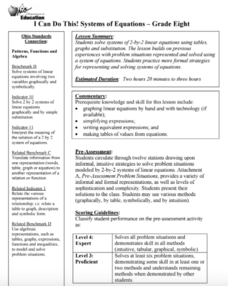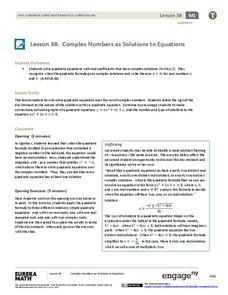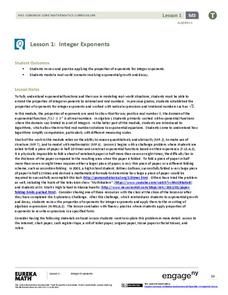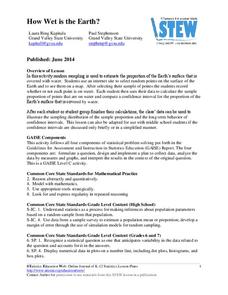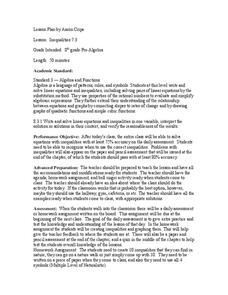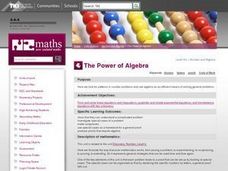Curated OER
Distributive Laws
In this distributive laws instructional activity, students solve and complete 8 different types of problems. First, they expand each equation by removing the brackets. Then, students remove the brackets and collect like terms in each. In...
Curated OER
Calculate the Slope of a Line Using Two Points
Find that slope! This video does an excellent job of demonstrating how to use the slope formula to find the slope of a line using two points. The instructor first reviews the definition of slope of a line, then works three problems using...
Curated OER
Polynomials and Linear Factors
This algebra worksheet reviews writing polynomials in standard form from factored form, looks at the graphs of polynomials of degree higher than two, and identifies the zeros of polynomials using the Factor Theorem and Fundamental...
West Contra Costa Unified School District
Derivation of the Quadratic Formula
What connection does the quadratic formula have with a quadratic equation? Using a matching activity, pupils construct the algebraic derivation of the quadratic formula in this Algebra II lesson task. The task provides two variations of...
EngageNY
Successive Differences in Polynomials
Don't give your classes the third degree when working with polynomials! Teach them to recognize the successive differences and identify the degree of the polynomial. The lesson leads learners through a process to develop an understanding...
Curated OER
Solving Rational Equations
In this algebra worksheet, learners solve rational equations including two application problems. This worksheet contains explanations to aid in understanding.
Ohio Department of Education
I Can Do This! Systems of Equations
Use tables, graphs, and substitution to solve systems of linear equations. An envelope of sample problems is passed around the classroom, and each learner has the opportunity to solve the system in the envelope. This is a great way to...
Curated OER
Ratios and Proportions
This study guide would be great to use when presenting a lesson on ratios and proportions. It includes clear definitions, explanations, and examples to work through as a class or individually. In addition, it has notes on rates and...
Inside Mathematics
Coffee
There are many ways to correlate coffee to life, but in this case a worksheet looks at the price of two different sizes of coffee. It requires interpreting a graph with two unknown variables, in this case the price, and solving for...
Curated OER
A Saturating Exponential
Your learners analyze the familiar model of a cold beverage warming when it is taken out of the refrigerator. The general form of the equation and its graph are presented. Learners learn about the specific pieces of the function by...
EngageNY
Complex Numbers as Solutions to Equations
Quadratic solutions come in all shapes and sizes, so help your classes find the right one! Learners use the quadratic formula to find solutions for quadratic equations. Solutions vary from one, two, and complex.
EngageNY
Integer Exponents
Fold, fold, and fold some more. In the first installment of a 35-part module, young mathematicians fold a piece of paper in half until it can not be folded any more. They use the results of this activity to develop functions for the area...
EngageNY
Why Were Logarithms Developed?
Show your class how people calculated complex math problems in the old days. Scholars take a trip back to the days without calculators in the 15th installment of a 35-part module. They use logarithms to determine products of numbers and...
Curated OER
Measurement: 2D and 3D
Young scholars solve volume problems. In this geometry lesson, the class watches a video about clean water (link provided) and individuals compare the volume of different prisms, including an actual drinking glass. Extension activities...
EduGAINs
Solving Linear Equations
To find x, you have to get it by itself, correct? Individuals solve a linear word problem and share their solutions with others that solved the problem in a similar fashion. They then complete a self-assessment on how they feel about...
Curated OER
Explorations 5: Introduction to Limits
In this limit worksheet, students find the interval values of given functions. They identify constants, and plot graphs. This three-page worksheet contains approximately 20 problems.
Curated OER
Matrix Analysis of Networks
Explore the connection between a finite graph, a directed graph, and a matrix. Graph lines and identify the relationship of matrices in real-world scenarios. Then use this information to work with a partner to plan and design a...
Illustrative Mathematics
Exponentials and Logarithms I
This task focuses on using the verbal definition of the logarithm to understand that a logarithm is an exponent. Learners complete six computational exercises using the inverse properties of logs and exponents and answer two...
Statistics Education Web
How Wet is the Earth?
Water, water, everywhere? Each pupil first uses an Internet program to select 50 random points on Earth to determine the proportion of its surface covered with water. The class then combines data to determine a more accurate estimate.
Curated OER
Solving Linear Equations
How do you solve linear equations? Learn how to solve simple linear equations by applying properties of equality in this instructional slideshow. The materials include step-by-step instructions and key concepts to support understanding.
Curated OER
Adding and Subtracting Polynomials
For this algebra worksheet, students add and subtract 30 sets of polynomials. 12 problems involve addition, 17 are subtraction problems, and one involves both addition and subtraction of polynomials.
Curated OER
Inequalities 7.3
Graph inequalities and discuss the difference in their slopes. Learners observe rate of change as they compare linear, quadratic, and cubic functions.
Curated OER
Rationalizing Denominators with Radicals
In this radicals worksheet, students solve 10 different problems that include rationalizing the denominators in each problem. First, they rationalize the denominator. Then, students write the conjugate for each binomial. In addition,...
Curated OER
The Power of Algebra
First graders explore patterns. They look for patterns in number problems and use algebra as a means of solving general problems. Students devise a strategy to solve the number problem.






